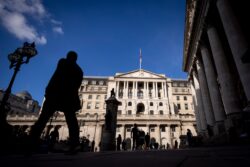The Bank is expected push up the Bank’s base interest by 0.75 percentage points to 3% (Picture: EPA)
The Bank of England is set to unveil the biggest interest rates hike in more than 30 years on Thursday as it battles to control the runaway inflation which is hammering British households.
In a crunch meeting, the Monetary Policy Committee is expected push up the Bank’s base interest by 0.75 percentage points to 3% – the highest since the 2008 financial crisis.
The move would represent the biggest single jump since 1989 and potentially add hundreds of pounds to mortgage repayments.
It will be the eighth time in a row that the Bank hikes interest rates. Less than a year ago the rate was 0.1%.
Earlier this month, markets had predicted the interest rate increase could be as much as one percentage point, but sentiment has calmed somewhat after the change of Chancellor and Prime Minister and Bank of England bond purchases pushed down on the cost of borrowing.
Markets have also witnessed a decreased appetite for large hikes globally, with the Bank of Canada increasing its interest rate by 0.5 percentage points, below the 0.75 percentage point rise which had been widely predicted.
Nevertheless, last month Bank of England Governor Andrew Bailey said it was likely the hike in interest rates could be bigger than the 0.5 percentage point increase to 2.25% seen at the previous meeting.
Governor of the Bank of England, Andrew Bailey (Picture: WPA/Getty)
He said on October 15: ‘As things stand today, my best guess is that inflationary pressures will require a stronger response than we perhaps thought in August.’
Analysts at Deutsche Bank have said they expect the Bank of England to opt for a 0.75 percentage point rise with a split vote.
Experts at the firm said they expect latest forecasts from the Bank of England, which will also be revealed on Thursday, to show that ‘the economic outlook has deteriorated further’.
They added: ‘Conditioned on market pricing, the UK economy will likely fall into a deeper and more prolonged recession.’
Interest rate hike will plunge more workers into debt, union warns
A leading trade union has warned that a hike in interest rates will plunge more workers into debt and financial hardship amid fresh evidence of the impact of the cost-of-living crisis.
A survey of 6,000 adults for Unite found that just over half said they cannot or will have difficulty paying their household bills this year.
Almost a third said they have already gone into debt or increased the levels of their debt just to put food on the table.
Unite said the survey, published hours before a Bank of England decision on interest rates, also revealed that one in seven admitted they are facing food poverty.
General secretary Sharon Graham said: ‘Unite’s research shows that many workers face unsurmountable financial pressure. An interest rate hike will shackle those workers with more debt while corporate profiteering runs rampant.’
The poll suggested that more than two thirds of workers have experienced a real-terms pay cut this year.
Ms Graham added: ‘It is corporate greed which is driving inflation and supercharging the cost-of-living crisis, not workers’ wages.
‘The political conspiracy of silence as they line workers and communities up for Austerity 2 must not go unchallenged.
‘An epidemic of profiteering is, quite literally, stealing the food from our tables. It remains remarkable that, in the teeth of all the evidence, the Bank of England is refusing to acknowledge that profits have to be tackled to address inflation.’
The Bank will also confirm its inflation expectations for the longer term, which are due to show that the cost of living will be much higher than the central bank’s 2% target next year.
James Smith, developed markets analyst at ING, also had a downbeat prediction for Bank’s latest economic outlook.
‘The new set of forecasts due, which crucially are based on market interest rate expectations, are likely to be dismal – showing both a deep recession and inflation falling below target in the medium term,’ he said.
‘That should be read as a not-so-subtle hint that market pricing is inconsistent with achieving its inflation goal.’
Get in touch with our news team by emailing us at [email protected].
For more stories like this, check our news page.
In a crunch meeting, the Monetary Policy Committee will make a decision that could drive up mortgage repayments for millions of homeowners.





